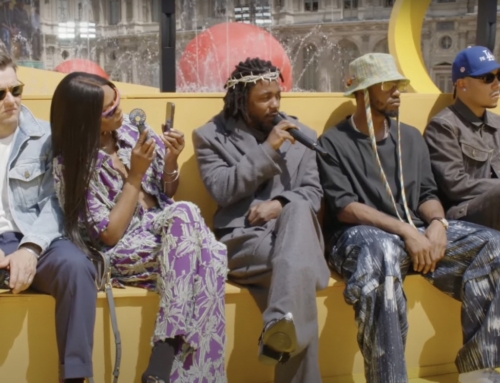Remember after the second Transformers movie hit theaters, actress Megan Fox went to the press to call director Michael Bay “Hitler”? Fox’s foot-in-mouth approach seriously cut into her career, and these days, she’s better known as being Brian Austin Green’s wife than actually doing anything.
So what does this have to do with dance music? Aside from the mainstream comparisons of success, Fox’s fall exemplifies one point everyone should take note of: You shouldn’t criticize what has made you successful. After all, before Transformers, Fox’s acting experience boiled down to roles in Olsen Twins and Lindsay Lohan flicks.
But one trend we’ve noticed when it comes to mainstream dance music producers and DJs is to go after the EDM machine – be it the culture, the growing commercialism behind it, or the sound.
The latest appears to be Diplo, in an August interview for Billboard. His statements criticizing the industry and his contemporaries follow Deadmau5’s extensive hate parade (the Miami New Times even compiled a list of the top 10 things the Canadian-born producer dislikes about EDM), and older performers like Tommie Sunshine, the Chemical Brothers, and Sasha disparaging the genre.
But in all of these instances, the “hater” fits a similar profile. For one, he believes that his music somehow differs from the mainstream, be it Deadmau5 thinking he’s above progressive/hardstyle/dubstep/anything popular, Diplo going back to his hip-hop and dance hall records, or the older guys believing they started it with something innovative.
Two, he has a substantial following. This could be anywhere from Diplo’s and Deadmau5’s extensive social media followers to people who actually read the tweets, statements, and blog posts from older artists or someone like Seth Troxler, who trolled the International Music Summit this year to criticize Team Avicii. They know that someone will listen to them.
Three, they directly benefit from the mainstream. This could be Diplo’s extensive pop star producing (he came up with M.I.A., has done mixes for Usher and Chris Brown, and is now working with Madonna), or was a harbinger of the stadium-filling dance music performance, like the Chemical Brothers and Sasha did in the ‘90s.
Does that combination of being successful yet “different” yet well-known shield these artists from hurting their careers? As EDM is still relatively new to the mainstream musical landscape, we’ll have to wait and see. For the time being, here are the reasons artists meeting these three qualifiers should carefully consider what they say to the press.
Criticism Feels Phony
A major point (and one Billboard emphasized with dollar figures through Diplo’s interview) is that EDM nets these top DJs a lot of money.
The DJ/producer born Wesley Pentz might not have made Forbes’ list of top-earning DJs for 2014, but Billboard estimates he took in close to $12 million last year. The magazine further points out that his DJing gigs command a price from $100,000 to $250,000 and a remix or production for another artist at $40,000 to $50,000 for a track.
Diplo, of course, isn’t alone, but how seriously do you take your craft and how much do you respect your fan base when you badmouth the genre and methods that brought you success?
As well, Diplo seems to flip-flop on embracing EDM. A year ago saw him harping on major record labels for chasing after the trend, and last month, he said to Billboard: “
So, for him and others taking the same stance, such statements ultimately make artist seem like he supports the genre when it’s convenient for him and distances himself when it’s not.
You Alienate Your Peers
Everyone knows a woman who says she’s “not like all the other girls”: She doesn’t care about makeup, watches football, eats whatever she wants, and talks about more “meaningful” subject matters, all while never getting overemotional over anything.
But the problem with that person – now, really, the “cool girl” archetype – is that no one likes her. The guys she claims are her “friends” that she “so relates to” never fully embrace her, while her constant “I’m different” rhetoric distances other women.
Within the dance music community, this could be the fate of producers that turn the “what’s wrong with EDM” argument against their peers. It’s no secret DJs talk smack about each other (just look at Twitter), but a minor beef blows over eventually. Criticizing someone’s music? It’s like the never-ending feud between Afrojack and Deadmau5.
The argument, for this and similar feuds, goes like this: Troll bait gets thrown out, often with an accusation of being “boring” and “unoriginal.” The target takes it personally and puts together a defense. Then, the initiator says, “Whatever, it’s not good enough,” and the target eventually responds with something like, “Stop thinking you’re so unique and obscure. You’re not that hot yourself.”
Now, just as much as Deadmau5 tries to seem choosey about whom he works with, it’s likely an aftershock of constantly stirring the shit.
Diplo kind of put the bait out there with his Billboard profile, saying: “All the DJs were at my Vegas night one night — I’m not going to name names, but all the big EDM guys — and I played a Juicy J record. They’re like, ‘Where do you get these records?’ I’m like, ‘They’re on the radio! You can buy them off iTunes!’ They really have no idea. They live in these bubbles. I’m like, ‘Damn, dudes, use your imagination a little bit.’ ”
So, for such a dumb accusation, who’s going to take the bait?
They’ll Dig Up Your Trash and Go Through It
One of the problems with mainstream music, and not just EDM, is critics are always looking for cracks in an artist’s façade. They’re looking for the next Milli Vanilli or Vanilla Ice to expose as someone completely fraudulent: fake back story, didn’t sing the song, or didn’t write the lyrics. And it doesn’t matter how long you’ve been in the game.
That’s partially why, when a vaguely-written GQ profile last year claimed Avicii just adjusts the volume when he DJs and learned his skills behind the decks from Ash Pournouri, fans and the press harped on the Swedish producer prodigy for being “manufactured.” Actions like Seth Troxler’s at the International Music Summit just added fuel to the fire.
And Billboard does this with Diplo, a bit. Whether he realizes it or not, his success comes not at the back of Major Lazer, although he likely wishes it did, but collaborating with M.I.A. first and then producing tracks for artists like Alex Clare, Chris Brown, and Usher. Even Madonna Instagrammed a picture of him in the studio, working on her next album.
In short, as much as Diplo wants to seem like the “authentic” guy who’s “doing something different” that his peers “just won’t understand,” he’s really just taking advance of the EDM pathway to success like David Guetta: Make some authentic music, hitch your way with a few pop stars, and then earn those millions playing in Vegas.
And beyond just the pop star collaborations, the EDM machine has benefitted stars like Diplo immensely. After all, beyond prime festival spots, the rise of mainstream dance music culture coincides with his Mad Decent Block Party’s success, which grew from a literal block party with Mad Decent artists in Philadelphia to a multi-date tour attracting talent like Outkast.
Two, social media’s effect, a big force in getting dance music out there, essentially saved his label, by turning “Harlem Shake” into a viral hit that translated into sales and high Billboard chart ranks.
It’s cliché at this point to say, “Don’t bite the hand that feeds you” and “Be grateful for all you have.” But considering the short mainstream history of dance music, do you think that such behavior will start to kill DJs’ and producers’ careers?





